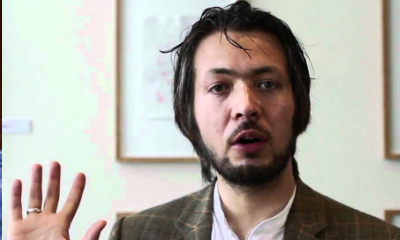I’ve known about the wonderful work the Poetry Translation Centre does for years, anlow is the first fourteen lines of the literal translation of the firsd when they asked me to help translate Reza’s poems, I was very keen to give it a go. Before I was asked to work with Reza, my experience of translating was very limited indeed. When I lived for a couple of years in Rome I tried to do versions of a few poems by Montale and Valerio Magrelli, but only to try to help my Italian, and the results were fairly ugly, shapeless, makeshift things. Also, since they were for my eyes only, I had no restrictions on what I could or couldn’t do, deviating where I felt it necessary or adding a detail or three. I realized with Reza’s work that it was going to be a very different enterprise: I knew no Dari, and very little about Persian culture.
When I was in London for a few days I arranged to visit Hamid and Reza at the travel agency they both work at in Southall. The agency’s like an iceberg, with only a tiny proportion of it above the surface, and on the third or fourth level below I found Hamid and Reza in a back office. Over green tea, we went through a few more questions, with Hamid translating my English for Reza, and then Reza’s answers for me. I was never convinced I was fully ‘getting’ the poetry – but it became slightly easier to live with that mystification when I asked Reza to read a poem or two, in Dari, there in the office.
It was, initially, mildly awkward, but that soon faded as Reza got going. He’s a great reader of his work, and it turned out it was deeply beneficial to the whole process to hear how he read. Once he began speaking, I realized I could learn a great deal just from the tone in which he read. It was almost irrelevant that I couldn’t understand a word he was saying. I got the tone, the style, the import. He read in this unembarrassed, enthralled, rather grand voice, and if that was how the poet read them, that was also how they were written. Reza reads like he’s a channel for something greater than himself, and I realized that rather than trying to tame or domesticate his poems into western ideas of order or neatness, I should just try to present them in a language that did its best to allow their strength and power to come through. I aimed to keep the strangeness in them that I experienced on encountering them, and decided to worry less about technique and more about voice.
Extracted from on Translating Reza Mohammadi by Nick Laird
Download This Recording For Free
Subscribe to this Podcast on iTunes
Buy a short collection of Nick Laird’s Translations of Reza Mohammadi




